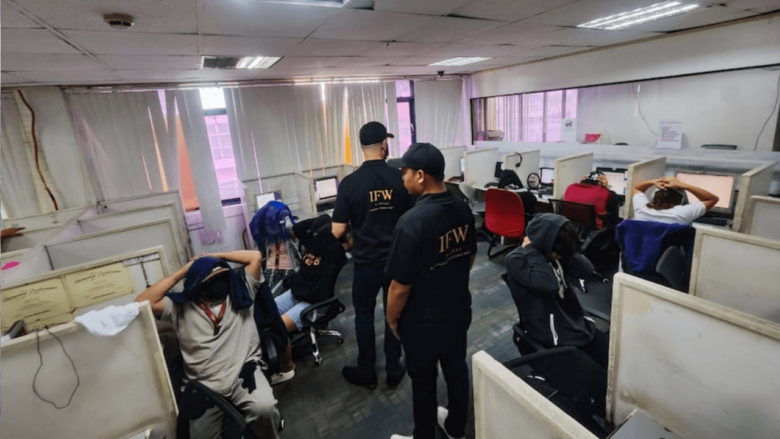Breaking Down the Raid: Inside the Philippines’ Largest Scam Center
In an audacious raid that captured global attention, authorities in the Philippines targeted what has been unveiled as one of the most extensive scam centers dedicated to romance online fraud. This bold operation led to the rescue of hundreds rescued from a sophisticated love fraud center, highlighting the alarming scale of deception hidden within the country’s borders.
Among those saved were many described as good looking individuals, a deliberate target for such centers in the Philippines that capitalized on their appearance to perpetrate romance scams on unsuspecting victims worldwide. This deep dive into the raid sheds light on the dark underbelly of digital deception, offering a beacon of hope to those still ensnared by similar schemes.
The Raid That Shook the Philippines: A Closer Look at The Rescue
The Prelude: How the Scam Center Was Uncovered
The Philippines, a beautiful archipelago known for its breathtaking landscapes and warm, hospitable people, found itself at the center of a nefarious operation. The discovery of this center was no accident; it was the culmination of months of intelligence gathering, spearheaded by a tip from a Vietnamese man who had narrowly escaped the clutches of this criminal syndicate.

This brave individual’s testimony provided the authorities with the breakthrough they needed, unveiling the operation masquerading as a legitimate online gaming firm but, in reality, was a front for various online frauds, including cryptocurrency fraud and, most prominently, romance fraud.
Rescue Operation: Liberating the Victims
The raid, executed with precision in the early hours, was a sight to behold. Elite units, alongside local police forces, descended upon the compound, a sprawling 10 hectare estate north of Manila, ready to confront the perpetrators and rescue the hundreds of people trapped within. Among the rescued were 383 Filipinos, 202 Chinese, and individuals from various countries, each with their own harrowing tale of deception and coercion.
Understanding the Scam: Techniques and Tragedies
The Lure of False Promises: Recruitment into the Scam
Victims were lured from all corners of the Philippines and abroad with the promise of high paying jobs, an offer too tempting to resist for many in search of better opportunities. However, upon arrival, their documents were confiscated, and the harsh reality set in—they were not employees but prisoners of a sophisticated scam operation.

The Mechanics of a Romance Scam
At the heart of the center’s operations were the romance frauds: a cruel game of cat and mouse where the scammers, using fake identities, cultivated intimate relationships with unsuspecting victims online. The operation’s success hinged on the scammers’ ability to coerce and manipulate, compelling their captives to defraud individuals looking for love or companionship.
- Profile Fabrication: Scammers meticulously craft attractive and believable online personas, often using stolen or stock photos of good-looking individuals to create profiles on social media or dating sites.
- Rapid Relationship Progression: The scammer quickly establishes a connection, professing love or deep affection unusually fast to create a false sense of intimacy and trust.
- Isolation Tactics: Victims are often encouraged to communicate outside of the initial platform, via private messaging or email, isolating them from the safety features and moderation of the original site.
- Manufactured Crises: The scammer concocts emergencies or financial crises that require immediate financial assistance, exploiting the victim’s emotional investment.
- Money Requests: Initially small amounts to test the waters, but gradually increasing in size, often for emergency medical treatments, travel expenses to visit the victim, or investment opportunities.
- Plausible Deniability: Scenarios and requests are crafted with enough detail and realism to be plausible but vague enough to avoid easy verification, a hallmark tactic in romance scams.
- Ghosting and Repetition: Once the scammer secures the funds or realizes the victim cannot or will not send more money, they often cut off communication, only to recycle their tactics on new victims.
- Cryptocurrency and Gift Cards: Increasingly, scammers request payments in cryptocurrency or gift cards, which are harder to trace and nearly impossible to recover, complicating the rescue efforts for victims’ lost assets.
- Long term Manipulation: Some scammers maintain the relationship for months or years to milk the victim for money repeatedly, a psychological ordeal for the person rescued from the love scam center.
- Secondary Scams: Victims may be targeted in follow-up scams, including offers to recover lost funds for a fee or threats to expose compromising interactions unless paid off.

The Dark World of Online Exploitation: A Closer Examination
The recent raid in the Philippines has thrown a stark light on the harrowing world of online exploitation, where cryptocurrency scams, fake investment schemes, and ruthless manipulation prey on hundreds of thousands of people globally.
Cryptocurrency Frauds and Fake Investment Schemes
The digital age has seen a significant rise in cryptocurrency scams and opportunities to invest in fake schemes. Scammers, operating from centers like the one police said they raided in the Philippines, concoct elaborate digital fronts to lure individuals with the promise of high returns on investments. Victims, seduced by the allure of quick wealth, find themselves entangled in a web from which escape seems impossible.
The Plight of the Workers
Among those ensnared are not just the victims of the scams but also the workers who failed to achieve unrealistic quotas set by their captors. Many of these workers, including a significant number of Chinese nationals, were physically harmed as a punishment for their perceived failures. Reports from the raid detail a chilling environment where individuals were unable to leave, effectively making them prisoners within the scam center.
Forced to Work Under Duress
Upon arriving in the Philippines, many workers found the reality far removed from what had been promised. Instead of opportunities, they found exploitation. Forced to work in conditions that violate their human rights, these individuals became unwilling cogs in a vast machine engineered to defraud and deceive. The centers were forced to send out thousands of messages a day, reaching out to potential victims under the strict watch of their overseers.
A Global Challenge
This incident underscores a global challenge: hundreds of thousands of people are at risk of exploitation through various online scams. The operation in the Philippines is but a drop in the ocean, a single node in a vast network of scam centers that operate with impunity across borders. The international community must come together to address this pervasive threat, enhancing cooperation and strengthening legal frameworks to protect innocent individuals from falling prey to these digital predators.
The stories of those rescued from the love fraud center serve as a grim reminder of the human cost of inaction. It is a call to arms for nations, law enforcement agencies, and the global community to intensify efforts in combating the scourge of online fraud, ensuring that justice is served for the victims and that measures are put in place to prevent such atrocities from occurring in the future.

The Aftermath: Impact and Implications
Legal and Social Repercussions for the Scam Center
In the wake of the raid, the Philippines government and international bodies rallied to address the fallout. Eight suspects were immediately detained, facing charges related to illegal detention, human trafficking, and participation in an organized crime syndicate.
Healing and Rehabilitation: Support for the Victims
Emerging from the shadows of the scam center, the rescued individuals faced a long journey toward recovery. Psychological support, legal assistance, and reintegration programs became pivotal in their healing process.
H2: Preventing Future Scams: Lessons Learned
Strategies to Combat Online Scams
The raid in the Philippines has not only exposed the grim realities of romance fraud but also highlighted the urgent need for comprehensive strategies to combat online scams. To this end, authorities, cybersecurity experts, and online platforms must collaborate more closely than ever.
Public awareness programs play a crucial role in educating the masses about the dangers of online scams, focusing on red flags such as unsolicited romantic advances or investment opportunities. Moreover, online platforms are increasingly adopting ID verification measures to ensure user authenticity, significantly reducing the chances of scammers exploiting these mediums for their fraudulent activities.
The Role of Technology in Fighting Cybercrime
As scammers evolve, so does the technology to fight them. This section delves into the cutting-edge technologies that are being deployed to track, expose, and dismantle fraud centers. From blockchain analysis tools that can trace cryptocurrency transactions back to their source to machine learning algorithms capable of identifying scam patterns in data, technology is on the front lines of the battle against cybercrime.
Big data analytics also offers promising prospects, enabling law enforcement and cybersecurity firms to analyze vast amounts of data for suspicious activities. Meanwhile, collaborations between tech companies and governments are strengthening the global response to cybercrime, making it increasingly difficult for scam centers to operate with impunity.
Conclusion: A New Dawn in the Fight Against Online Scams
The raid on the scam center in the Philippines is a watershed moment in the ongoing struggle against online scams. It serves as a stark reminder of the pervasive threat posed by cybercrime, but also as a testament to what can be achieved when the global community comes together to tackle these challenges. As we move forward, it is imperative that we continue to share knowledge, bolster our defenses, and remain vigilant against the ever evolving tactics of scammers.
In this new dawn, the collective effort of governments, technology firms, cybersecurity experts, and the public will be crucial in turning the tide against online scams. By fostering an environment of awareness, innovation, and collaboration, we can aspire to a safer digital world for all.
Frequently Asked Questions
How can I tell if I’m the target of a romance scam?
If someone you’ve met online seems too good to be true, they might be. Be wary of individuals who profess love quickly, refuse to meet in person, and ask for money or personal information.
What should I do if I suspect a loved one is being scammed?
Open a dialogue with them about the signs of online fraud without judgment. Encourage them to cut off communication with the scammer and report the situation to the authorities.
Are there any resources available for scam victims?
Yes, numerous resources offer support and advice to scam victims. These include national fraud reporting centers, non-profit organizations dedicated to cybercrime victims, and local law enforcement agencies.
How do fraudsters convince people from around the world to invest in fake schemes?
Fraudsters use a variety of manipulative techniques to convince people from around the world to invest in fake schemes. This often involves creating a false sense of trust and security, using fake testimonials, and presenting elaborate but entirely fictitious investment opportunities that promise high returns with little to no risk.
What are the common tactics used to lure thousands of people from around into these frauds?
Common tactics include creating highly persuasive and professional looking online ads, sending personalized messages or emails, and even making direct phone calls to thousands of people from around the globe. These methods are designed to create a sense of urgency or a once in a lifetime opportunity, pushing victims to make quick decisions without due diligence.
How can individuals recognize and protect themselves against being forced into criminal activity through fake schemes or businesses?
To protect against being forced into criminal activity through fake schemes or businesses, individuals should verify the legitimacy of any business or investment opportunity by conducting thorough research, seeking independent financial advice, and being wary of any arrangement that requires upfront fees for vague promises of future gains or employment.
Are men and women targeted differently by fraudsters looking to lure victims?
Yes, men and women may be targeted differently, as fraudsters often tailor their approaches based on perceived vulnerabilities or interests. For example, women might be more frequently targeted with romance frauds, while men might receive offers related to investments. Understanding these targeted tactics can help individuals remain vigilant and skeptical of unsolicited offers or relationships.
What steps can be taken to assist victims who were deceived into investing in fake schemes or businesses?
Victims can seek legal advice to explore options for recovering losses, report the fraud to relevant authorities to prevent further victimization, and access psychological support services to deal with the emotional distress caused by the fraud. Additionally, sharing their experiences can help raise awareness and prevent others from falling for similar fake schemes or businesses.



